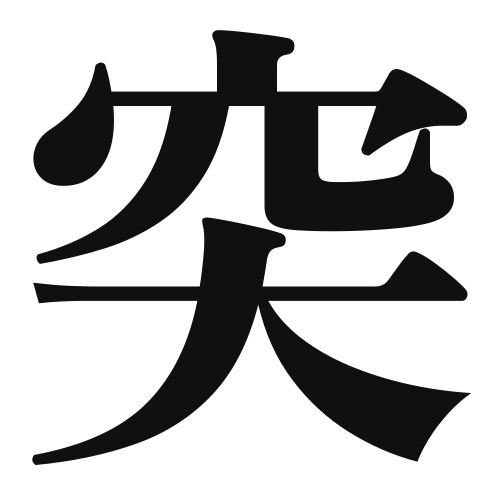1. Overview of Meaning
The kanji “突” (totsu) generally means “to thrust,” “to poke,” or “to strike.” It conveys the idea of a sudden or forceful action directed towards something.
2. Formation and Radical
Formation of the Kanji: The kanji “突” is a phonetic-ideographic character (形声文字). It combines the radical for “strike” (打) with a phonetic component that suggests its pronunciation.
Radical: The radical for “突” is “打” (to hit or strike), which relates to the action of thrusting or poking.
3. Examples of Usage
Common Words and Phrases: Some frequently used words that include “突” are:
- 突撃 (つげき, tsugeki) – “charge” or “assault”
- 突発 (とっぱつ, toppatsu) – “sudden occurrence”
Example Sentences in Daily Conversation:
- 彼は突然、私の肩を突いた。 (かれはとつぜん、わたしのかたをついた。) – “He suddenly poked my shoulder.”
- 突発的な問題が発生した。 (とっぱつてきなもんだいがはっせいした。) – “A sudden problem occurred.”
4. Synonyms and Antonyms
Similar Kanji: A similar kanji is “刺” (し, shi), which means “to stab” or “to pierce.” While both involve a sharp action, “刺” implies a more penetrating action compared to “突,” which is more about thrusting.
Opposite Kanji: An antonym is “引” (ひく, hiku), meaning “to pull.” This represents a motion that is opposite to thrusting or pushing forward.
5. Cultural and Historical Background
Relation to Japanese Culture: The concept of “突” is often associated with martial arts and combat, where thrusting techniques are essential. It also appears in various traditional practices and games.
Proverbs and Idioms: One common expression is “突き進む” (つきすすむ, tsukisusumu), meaning “to push forward” or “to advance boldly,” reflecting the proactive nature of the action described by “突.”
